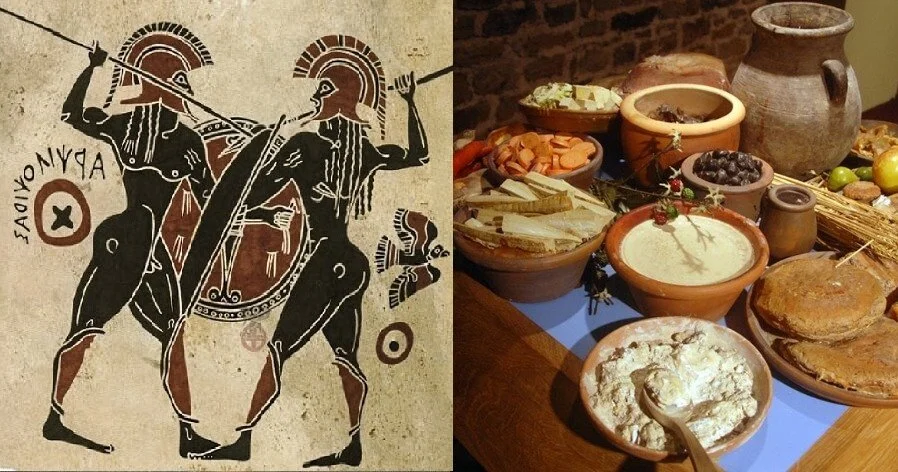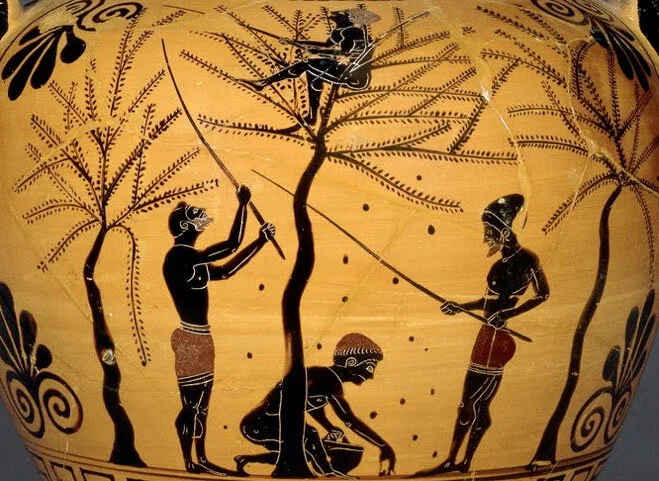The Spartans were characterized by self-discipline and austerity, and this was expressed even in their eating habits. They generally did not allow themselves to be near indulgent foods and believed that gluttony should be controlled - after all, obesity was reprehensible.
The diet of the ancient Spartans seems to have been designed to provide as much energy and strength as possible, but without straining the stomach and digestion. The staples of their diet contained elements that directly helped protect their health and strengthened them against disease. Read what these foods are and how you can include them in your diet:
Olives
In ancient Greece, the olive tree occupied an important place, both in the diet of the citizens and in the economy of the cities. The olive fruit is a source of fatty acids. The olive provides the body with fiber and minerals and is a source of vitamin E, which is a natural antioxidant. Vitamin E is also thought to slow cell membrane damage and fight osteoporosis.
Barley
Barley was the basis of the diet of the ancient Spartans, as it was already abundant in the area. The Spartans seem to have known how important carbohydrates are as the main source of energy for the body. Unlike wheat, barley contains both forms of fiber.
Soluble fiber dissolves in water to form something like a jelly, which helps lower cholesterol and control blood sugar. Insoluble fiber increases movement in the gastrointestinal tract and is especially beneficial for people who suffer from constipation.
Barley is also a good source of tocotrienols, substances that have antioxidant properties and the ability to lower bad cholesterol (LDL) by limiting the activity of an enzyme in the liver responsible for producing cholesterol.
Barley is also a source of beta-glucan, a type of carbohydrate that also controls blood sugar and cholesterol levels.
Include it in your diet: Start with the barley nut. You can eat it with your coffee in the morning, grate it into salads and soups, or add it to your meal instead of bread. Then you can boil barley in water and combine it with legumes and meat or add it to salads.
Cheese
The cheese was a particularly important food in ancient Greece, accompanying the main course (excellent source of protein and calcium). Recent research shows that it is also a rich source of CLA (Conjugated Linoleic Acid), which appears to have anti-cancer effects but may also reduce body fat by increasing muscle mass. In addition, it may protect against tooth decay. Some cheeses have a protective property due to some chemical and physical properties.
Cheese increases saliva production, which in turn reduces the production of caries-causing acids and helps rinse the mouth of sugar. In addition, calcium and phosphorus are elements that play a role in strengthening tooth enamel.
Figs
They are directly related to Greece. It is an excellent source of both types of fiber, like barley, but it is not the only one: research from the University of Scranton has shown that figs contain more antioxidants than other fruits.
In addition, research from Rutgers University has shown it to be a source of particularly beneficial omega-3 fatty acids as well as phytosterols. Phytosterols have been shown to reduce cholesterol treatment in the body. It is also a good source of protein, iron and calcium.
Use it in your diet: The easiest way is to eat them dry. You can find them in any supermarket, they are easy to take on a trip and do not need a refrigerator. You can add them to salads, yogurt and cereals. Of course, in his time, he preferred the fresh ones.
Melas Zomos (Spartan Black Soup/Broth)
A special dish for the Spartans that was offered at meals. It was a type of soup that took some getting used to because of the taste. Basically, they cooked pork with blood and salt and accompanied it with barley bread. They believed it gave them strength. They were probably right. First of all, pork is an excellent source of protein with high biological value (meaning it contains all the necessary amino acids), but it is also one of the best sources of B vitamins, which play a role in releasing energy from carbohydrates.
In addition, a 100-gram serving provides 30% of the body's need for zinc, a mineral that activates more than 100 enzymes in the body and is essential for DNA production. The blood in the recipe was a source of calories, protein and iron. Combined with bread, they had a full, fortifying meal.
Include it in your diet: Of course, we are not going to suggest you cook blood with meat and drink it every day, but you can make a soup inspired by this broth. Put in a pot, pieces of pork roasted in the oven, along with potatoes, onions, a little chopped tomato, salt and pepper. Cook them for 45 minutes. But if you want a little blood flavor, there are products made from blood - such as blood sausages, which can be found in France, Germany, Finland and other countries - but also the famous English blood pudding.
Wine
The wine had a prominent place in the diet of the ancient Spartans. However, this did not mean that they drank freely. Each person at the meal was given a glass of wine mixed with water, which they refilled as needed. But Spartans did not tolerate the drunkards.
With this clever trick of water with wine, the Spartans could control the amount of alcohol they drank.
It has been proven that moderate consumption of any drink improves lipid levels, but wine and especially red wine has more than 200 phenolic substances (antioxidants). These substances seem to have properties that may protect against some cancers, especially prostate, colon and breast cancer.
Build them into your diet: The secret here is quantity. Two glasses of wine a day for men (one for women) is the amount that seems to have beneficial properties. Beyond that amount, you have the opposite result: an increased risk of developing cancer and cardiovascular disease.















